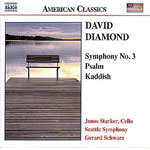
Symphony No. 3; Psalm; Kaddish
 $25.00
Out of Stock
$25.00
Out of Stock6+ weeks add to cart
DAVID DIAMOND
Symphony No. 3; Psalm; Kaddish
Janos Starker (cello); Seattle Symphony Orchestra / Gerard Schwarz
[ Naxos American Classics / CD ]
Release Date: Wednesday 15 September 2004
This item is currently out of stock. It may take 6 or more weeks to obtain from when you place your order as this is a specialist product.
"Fresh, devoted performances of music fully worthy of continued attention would be a fair reaction to this disc."
MusicWeb Sept 2004
"Fresh, devoted performances of music fully worthy of continued attention would be a fair reaction to this disc.
The Seattle Symphony play David Diamond's music as if it is in their very bones, Schwarz conducts as if his life depends on it, the recording is superb (fairly bright and up-front, as befits much of this music) and the music itself fully repays repeated listening."
- MusicWeb Sept 2004
"Naxos is doing a major service by picking up what there is of this series and re-releasing them at budget prices... The performances are all one could ask. Clearly Schwarz and his orchestra are on friendly terms with Diamond's style and it is unlikely these works will receive better recordings any time soon. I am so pleased that Naxos is including these works in its acclaimed American Classics series...Highly recommended."
- Scott Morrison, Amazon.com, June 2003
"The Seattle Symphony's fine recordings for Delos in the '80s and '90s, conducted by Gerard Schwarz, helped spark a revival of interest in mid 20th-Century American symphonists like David Diamond, Walter Piston, Howard Hanson and others.
The Third Symphony (1945) captures his conservative but ever-fresh sound world - the muscular lyricism, tonal harmony, rhythmic punch and bold use of color. From 1987, "Kaddish" for cello and orchestra reveals how consistent Diamond's language remained. The prayerful reading by cellist Janos Starker has great nobility."
- Mark Stryker, Detroit Free Press
Seattle Symphony Honorary Composer in Residence David Diamond was born on 9th July, 1915, in Rochester, N.Y. He clearly declared his principles in his own words: "It is my strong feeling that a romantically inspired contemporary music, tempered by reinvigorated classical technical formulas, is the way out of the present period of creativity chaos in music…To me, the romantic spirit in music is important because it is timeless". This captures the essence not only of the composer himself, but of an entire generation of American composers whose heartfelt music was born during the Great Depression and World War II. Yet rather than merely characterize a past era, the "romantic spirit" has been re-kindled during the past-quarter century. For some thirty years following World War II, the apostles of post-Webernian serialism and its offshoots determined the course of contemporary classical music. Diamond, and other such neo-Romantic voices as Roy Harris, Samuel Barber, Howard Hanson, William Schuman and Walter Piston, to name only American composers of that persuasion, was dismissed with an imperious wave of the academic hand and a curt "irrelevant" from the lips-or pen-of the ideologically purist Pierre Boulez.
David Diamond lived in Italy during the 1950s, returning to the United States for his fiftieth birthday in 1965. "I lived in Italy for close to sixteen years," he confided, "and the entire Italian musical establishment was dominated by the advanced twelve-note avant-garde. Everywhere I submitted music it was turned down because it was considered old-fashioned."
While in no way demeaning the many fine works that have come from Boulez and gifted composers who trod the chaste path of serialism, time has proven them wrong in consigning Diamond and his gloriously unrepentant Romantics to the trash bin of music history. In music, as in life itself, there are many roads to truth, many different drums whose rhythms attract some and repel others. One thing is very clear: many composers and audiences have either re-embraced the Romantic spirit or never left its enveloping warmth in the first place.
Tracks:
Psalm (1936) [8'39].
Kaddish (1987) [10'44].
Symphony No. 3 (1945) [31'08].



